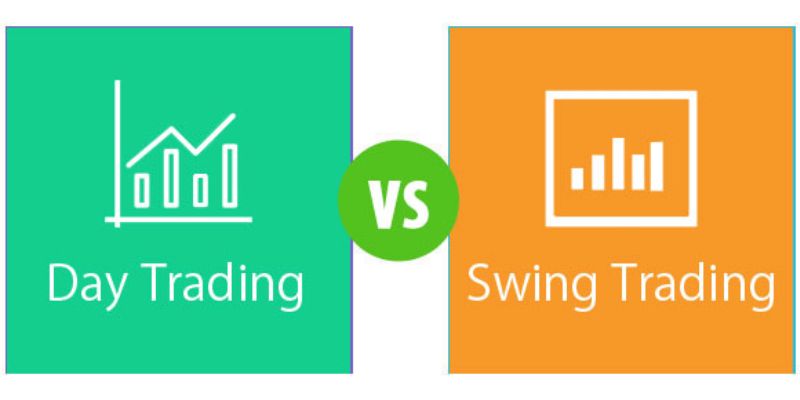Swing Trading vs Day Trading: What is the Difference?
Susan Kelly
Oct 28, 2023
Are you interested in investing and trading the stock market? Do you need clarification about which strategy to choose, swing or day trading? Both strategies have benefits and drawbacks, but knowing which will benefit your particular goals more is challenging. We’ll take a closer look at both strategies and explore how they differ so that you can decide what works best for you.
Swing Trading vs. Day Trading: An Overview

Swing and day trading are two popular strategies for buying and selling stocks, but they have some major differences. Swing trading is a longer-term strategy that considers the market's overall direction. It's designed to capture gains over a few days or weeks by taking advantage of short-term price swings in individual stocks or broader indices.
On the other hand, day trading is a much shorter-term approach, where traders try to profit from small intraday price movements by opening and closing positions within the same day.
Advantages of Swing Trading

Lower Risk
With swing trading, you can limit risk by holding onto positions longer. This allows you to consider the market's overall direction and set yourself up for larger profits with less volatility.
More Opportunities
When compared to day traders, who may only trade one or two stocks each day, swing traders have more opportunities to capitalize on multiple trades within the same week.
Less Stressful
Swing trading requires less analysis and decision-making than day trading since it follows long-term trends in price action rather than trying to predict intraday movements.
Ability To Hold Onto Winners
Since swing traders are willing to hold onto positions for longer, they can take advantage of stocks that show strong performance and increase value over multiple days.
Less Capital Required
Since swing traders are more patient and take a longer-term view of the market, they don't require as much capital to enter trades since there is less need for quick profits.
Disadvantages of Swing Trading
Longer Time Horizon For Profits
Swing trading involves positions that may last weeks or months, so profits from successful trades can take longer than day traders, who tend to close their positions within the same day.
Risk Of Missing Big Moves
Swing traders may miss out on big price movements if they don’t monitor their positions closely. This is because the price of a stock may move very quickly in an intraday timeframe, which could result in missed opportunities to capitalize on short-term profits.
Not Suited For Volatile Markets
Swing trading is more suited for low-volatility markets since it focuses on longer-term trends rather than day traders who take advantage of intraday movements. Therefore, swing traders may need help to make successful trades during periods of high volatility.
Limited Opportunity To Profit From Downtrends
Swing traders typically look for uptrends to profit from rising prices and thus can't benefit from stocks falling in value. Day trading strategies can be used to take advantage of downward moves during the day, but swing traders must wait for long-term downtrends to be profitable.
Higher Commission Costs
Since swing traders buy and sell stocks with a longer holding period than day traders, they may incur higher commission costs due to more frequent trades.
Advantages of Day Trading
Quick Profits
Day traders can open and close positions quickly, which allows them to capitalize on small intraday price movements. This means that profits from successful trades can be realized much faster than swing trading.
Low Capital Requirements
Since day traders take advantage of short-term price movements, they don't need as much capital to enter trades as swing traders. This is because day traders can enter and exit the market in a single session, meaning there's less money needed for a margin account or other expenses associated with holding onto stocks for extended periods.
Suitability For Volatile Markets
Day trading strategies are better suited for markets that experience high levels of volatility since the goal is to capture quick profits within a single day.
More Trading Opportunities
Day traders have more opportunities to capitalize on short-term price movements than swing traders since they can open and close positions within the same day. This allows them to take advantage of multiple intraday trading opportunities.
Lower Commission Costs
Since day traders tend to close out their positions within the same day, commission costs are typically much lower than those incurred by swing traders who may hold onto stocks for weeks or months.
Disadvantages of Day Trading
High Risk
Day traders are exposed to more risk since they take advantage of short-term price movements. A single wrong move or missed opportunity can result in large losses, whereas swing traders have more time to adjust their positions if prices move against them.
Stressful
Day trading requires constant monitoring and decision-making as the market moves, which makes it very stressful for those trying to capture intraday profits.
Limited Opportunity To Profit From Uptrends
Since day trading strategies focus on capturing small short-term price movements, they may need help to take full advantage of long-term uptrends in stocks since these occur over a longer period.
Lower Returns
Due to the higher risk involved in day trading, returns tend to be smaller than swing traders who can hold positions longer. This means that day traders may have to take many more trades than swing traders to generate similar profits.
FAQS
Is swing trading safer than day trading?
Swing trading is less risky than day trading as it involves holding onto positions for longer and allowing the market to favor your position. On the other hand, day trading is much more volatile and requires constant monitoring and decision-making.
Which type of trading is best for beginners?
Swing trading is generally better suited for beginners as it requires less analysis and decision-making than day trading. It also allows traders to take advantage of longer-term trends in the market rather than trying to predict intraday movements.
How many days is swing trading?
Swing trading can involve positions lasting anywhere from one day to several weeks or months. The time a position is held will depend on the trader's strategy and market conditions.
What’s wrong with holding a trade overnight if you’re a day trader?
If you are a day trader, holding a trade overnight can lead to greater risk as the markets may move against your position while you are not actively monitoring it. This could result in losses if the market moves quickly and unexpectedly, which is why most day traders close out their positions within the same day.
Overnight positions incur additional costs, such as commissions and margin fees. Therefore, it is generally advisable for day traders to avoid holding trades overnight.
Why do Swing Traders Hold Positions From Days to Weeks?
Swing traders hold positions from days to weeks to take advantage of longer-term market trends. This is because swing trading focuses on identifying the start of a trend and capitalizing on it with medium-term trades, which usually last a few days up to several weeks or months.
By holding onto positions for this time, swing traders can capture larger profits than day traders, who typically close out their positions within the same day. Holding stocks for extended periods reduces commission costs since fewer trades must be placed.
Conclusion
In conclusion, understanding the differences between swing trading and day trading can be a helpful tool for any investor looking to increase their portfolio and profits. Day trading involves higher risk with much faster dealing times, while swing trading offers lower risks but slower returns. Both strategies have pros and cons, and which one an individual investor chooses to pursue should be based on their risk tolerance, overall strategies, lifestyle needs, and budget.







